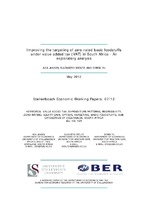| dc.contributor.author | Yu, Derek | |
| dc.contributor.author | Jansen, Ada | |
| dc.contributor.author | Stoltz, Elizabeth | |
| dc.date.accessioned | 2021-04-16T09:25:10Z | |
| dc.date.available | 2021-04-16T09:25:10Z | |
| dc.date.issued | 2012 | |
| dc.identifier.citation | Ada Jansen & Elizabeth Stoltz & Derek Yu, 2012. "Improving the targeting of zero-rated basic foodstuffs under value added tax (VAT) in South Africa - An exploratory analysis," Working Papers 07/2012, Stellenbosch University, Department of Economics. | en_US |
| dc.identifier.uri | https://www.ekon.sun.ac.za/wpapers/2012/wp072012/wp-07-2012.pdf | |
| dc.identifier.uri | http://hdl.handle.net/10566/6065 | |
| dc.description.abstract | VAT without any exemptions or zero-rating is regressive. Since the inception of VAT in South Africa, there has been an ongoing debate around the issue of zero-rating to alleviate the burden on poor households. This paper uses vegetables as an example and conducts tax incidence analyses to compare the relative burden of VAT on vegetables for various income groups. It finds that differential treatment of the zero-rating of VAT on various categories of vegetables could be beneficial in terms of relative equity gains. It is suggested frozen vegetables remains zero-rated, whereas canned vegetables and some fresh vegetables items be zero-rated. | en_US |
| dc.language.iso | en | en_US |
| dc.publisher | Stellenbosch University | en_US |
| dc.subject | Value added tax | en_US |
| dc.subject | Expenditure patterns | en_US |
| dc.subject | Regressivity | en_US |
| dc.subject | Zero-rating | en_US |
| dc.subject | Equity gain | en_US |
| dc.title | Improving the targeting of zero-rated basic foodstuffs under value added tax (VAT) in South Africa - An exploratory analysis | en_US |
| dc.type | Working Paper | en_US |

